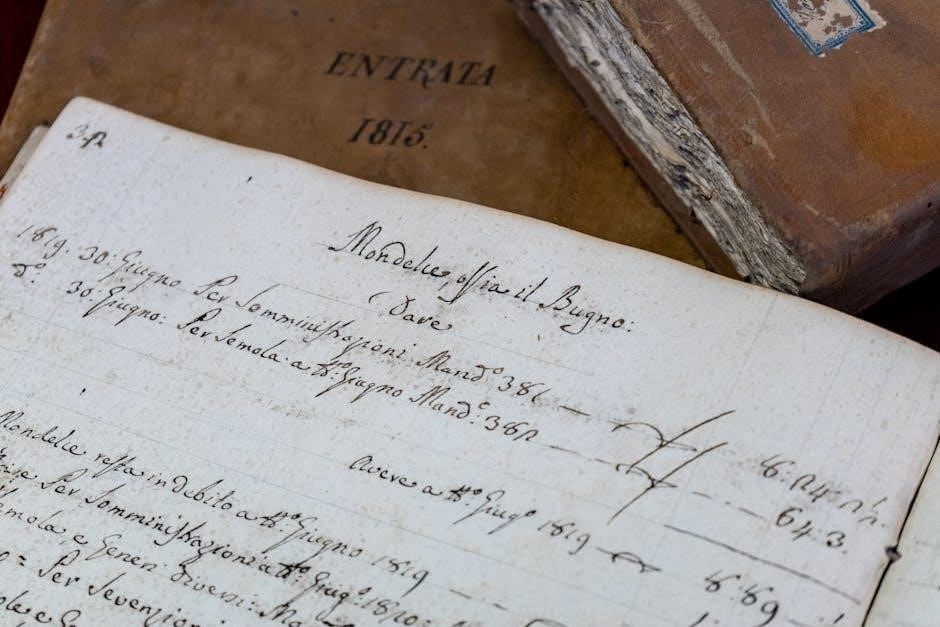A Colorado Last Will and Testament is a legal document outlining how an individual’s assets should be distributed after death. It is also known as a “Last Will” and is essential for estate planning. This document allows individuals to express their wishes regarding property distribution, ensuring their estate is managed according to their preferences. Governed by Title 15 of the Colorado Revised Statutes, having a will in Colorado helps avoid intestacy and provides peace of mind for both the testator and their loved ones. The Colorado Last Will and Testament PDF is a standardized template that simplifies the process of creating a will, covering key aspects like executor appointment, asset distribution, and guardianship. It is free to download and user-friendly, making it accessible for residents to plan their estate effectively. Consulting an attorney is recommended to ensure the document is legally binding and meets all state requirements.
Definition of a Last Will and Testament
A Colorado Last Will and Testament is a legal document that outlines how an individual’s assets, property, and estate will be distributed after their death. It includes any testamentary instrument, such as a codicil, and may appoint an executor, revoke prior wills, or nominate guardians. Governed by Title 15 of the Colorado Revised Statutes, it ensures the testator’s wishes are legally binding, providing clarity and direction for estate management.
Importance of Having a Will in Colorado
Having a Colorado Last Will and Testament ensures your estate is distributed according to your wishes, avoiding intestacy and potential disputes among heirs. It allows you to appoint guardians for minor children, designate an executor, and specify asset distribution, providing clarity and peace of mind for your family. A will also helps protect your legacy and ensures your loved ones are cared for according to your intentions.

Legal Requirements for a Valid Will in Colorado
A Colorado will must be in writing, signed by the testator, and witnessed by two individuals. The testator must be at least 18 years old and of sound mind.
Eligibility to Create a Will
In Colorado, any individual who is at least 18 years old and of sound mind is legally eligible to create a will. This means the person must have the mental capacity to understand the nature of the document and its implications. The testator must be capable of making informed decisions regarding their estate, ensuring the will is valid and enforceable under state law.
Witness and Notarization Requirements
In Colorado, a Last Will and Testament must be signed by two witnesses or notarized to be valid. According to CRS §15-11-502, the will requires the signatures of two witnesses or a notary public. This ensures authenticity and prevents fraud. Witnesses should be impartial to avoid conflicts of interest, ensuring the document’s legality and enforceability.

Key Components of a Colorado Last Will and Testament
A Colorado Last Will and Testament must include the testator’s signature, witness signatures, and clear instructions for asset distribution, ensuring legal validity and clarity of intent.
Appointment of Executor
The Colorado Last Will and Testament requires the appointment of an executor, who must be at least 18 years old and of sound mind. The executor is responsible for managing the estate, paying debts, and distributing assets according to the will. They must act in the best interest of the estate and its beneficiaries. Naming alternate executors is also recommended in case the primary executor cannot serve. Clear communication with the chosen executor is essential to ensure they are willing and capable of fulfilling the role effectively.
Asset Distribution and Beneficiaries
The Colorado Last Will and Testament allows the testator to outline how their assets, including real and personal property, will be distributed after death. Specific bequests, such as gifts to individuals or charities, are detailed, along with the distribution of the residual estate. Beneficiaries must be clearly identified, and provisions can be made for minors or trusts. Regular updates are essential to reflect changes in the estate or family circumstances.
Guardianship and Trust Provisions
Guardianship provisions in a Colorado Last Will allow the testator to appoint a trusted individual to care for minor children or incapacitated dependents. Trusts can be established to manage assets for beneficiaries, ensuring funds are used as intended. Specific instructions can be outlined, such as education or healthcare preferences. This ensures the well-being of dependents and maintains control over asset distribution, even after the testator’s passing.
Creating a Colorado Last Will and Testament
Creating a Colorado Last Will and Testament involves drafting a legal document outlining asset distribution wishes. Use a downloadable PDF template to ensure compliance with Colorado laws and simplify the process.
Steps to Draft a Will
To draft a Colorado Last Will and Testament, start by downloading a PDF template. Outline your wishes for asset distribution, name an executor, and include guardianship details if needed. Ensure the document is signed in the presence of two witnesses or a notary public to comply with Colorado laws. Review and update the will periodically to reflect life changes. Consulting an attorney ensures legal compliance and clarity in your directives.
DOWNLOADABLE Colorado Last Will and Testament PDF Template
A downloadable Colorado Last Will and Testament PDF template provides a standardized framework for individuals to create a legally binding document. It includes sections for asset distribution, executor appointment, and guardianship details. The template is free and user-friendly, adhering to Colorado state laws. By using this template, residents can efficiently outline their final wishes and ensure compliance with legal requirements. Consulting an attorney is recommended for complex cases.

Types of Wills in Colorado
In Colorado, common types of wills include the Simple Will, Joint Will, and Codicil. Each serves distinct purposes, ensuring individuals can tailor their estate plans to specific needs and circumstances effectively.
Simple Will
A Simple Will is designed for individuals with straightforward estate plans, typically involving limited assets and a clear distribution plan. It allows the testator to specify how property, assets, and personal items should be distributed among beneficiaries. This type of will is ideal for those with uncomplicated family structures or minimal estate complexities. It often includes basic provisions, such as naming an executor, designating guardians for minor children, and outlining funeral preferences. A Simple Will is cost-effective and easy to create, making it a popular choice for many in Colorado. It ensures that the testator’s wishes are legally documented without unnecessary complexity, providing clarity and peace of mind for loved ones. Proper execution with witnesses or a notary is required to validate the document under Colorado law.
Joint Will
A Joint Will is a document created by two individuals, typically spouses or partners, outlining how their combined assets will be distributed after both pass away. It is signed and notarized by both parties, making it legally binding. A Joint Will ensures mutual wishes are respected and can provide clarity for surviving family members. However, it may not be ideal for complex estates or future changes, as amendments require mutual consent. This type of will is often used for simplicity in straightforward cases, ensuring shared assets are distributed according to the couple’s agreed-upon plan.
Codicil
A Codicil is a legal document used to make amendments or additions to an existing Last Will and Testament. It allows individuals to update their will without drafting a new one, ensuring minor changes are legally recognized. Governed by Colorado Revised Statutes, a Codicil must be signed, witnessed, and notarized like a will. It is ideal for small adjustments, such as updating beneficiaries or asset distributions, while maintaining the validity of the original document. Consulting an attorney is recommended to ensure compliance with Colorado estate laws and avoid potential legal issues. A Codicil simplifies the process of keeping a will current, providing peace of mind for testators. It is a convenient solution for those needing to revise their estate plans without redoing the entire will. This document is fully recognized in Colorado and ensures that the testator’s updated wishes are honored. Proper execution is essential to maintain its legal standing and effectiveness in estate planning. A Codicil is a practical tool for making targeted changes to a will, ensuring clarity and accuracy in one’s final wishes. It is particularly useful for individuals who wish to make specific adjustments without altering the entirety of their estate plan. By using a Codicil, testators can ensure their will remains up-to-date and reflective of their current desires, providing security for their loved ones. This approach is both time-efficient and cost-effective compared to creating a entirely new will, making it a popular choice for minor revisions. However, for significant changes, drafting a new will is often recommended to avoid confusion and ensure all provisions are clear and enforceable. A Codicil is a valuable resource for maintaining the integrity of one’s estate plan while addressing evolving circumstances and wishes. It serves as a flexible solution for testators seeking to adapt their will to life changes without unnecessary complexity. Through a Codicil, individuals can confidently update their estate plan, knowing their directives remain legally binding and aligned with their current intentions. This document underscores the importance of regular estate plan reviews to ensure all provisions are relevant and accurately reflect the testator’s desires. By leveraging a Codicil, individuals in Colorado can efficiently manage their estate planning needs, ensuring their legacy is preserved according to their wishes. It is a testament to the adaptability of estate planning tools in addressing the dynamic nature of life’s circumstances.

Advantages of Having a Colorado Last Will and Testament
Having a Colorado Last Will and Testament ensures assets are distributed according to personal wishes, avoids intestacy, and provides tax benefits while maintaining privacy and family harmony.
Avoiding Intestacy
Avoiding intestacy is a primary advantage of having a Colorado Last Will and Testament. Without a will, the state’s intestacy laws dictate asset distribution, potentially disregarding personal wishes. This can lead to family disputes and unintended outcomes. A will ensures that the testator’s desires are respected, providing clarity and control over how their estate is managed and distributed, thus avoiding the complexities of intestate succession and ensuring peace of mind.
Tax Benefits
A Colorado Last Will and Testament can provide significant tax benefits by minimizing estate taxes and ensuring assets are distributed according to tax-efficient strategies. Proper estate planning through a will allows individuals to utilize exemptions, reduce taxable assets, and structure inheritances to benefit beneficiaries. Consulting an estate planning attorney can help maximize these tax advantages, ensuring the estate is managed in a way that aligns with both legal and financial goals.
Ensuring Privacy
A Colorado Last Will and Testament ensures privacy by allowing individuals to control how their assets are distributed after death. Unlike intestacy, which is a public process, a will enables private management of the estate. By specifying beneficiaries and asset distribution, the testator maintains confidentiality and protects sensitive information from public scrutiny. This ensures personal wishes remain honored without unnecessary disclosure.

Probate Process in Colorado

Colorado offers both informal and judicial probate processes. Informal probate is a straightforward option for simpler estates, while judicial probate handles complex cases with court supervision, ensuring all legal requirements are met.
Informal vs. Judicial Probate
In Colorado, informal probate is an administrative process for simpler estates, often uncontested and faster. Judicial probate involves court oversight, typically for complex cases with disputes or legal challenges. Informal probate is preferred for smaller estates, while judicial probate ensures all legal requirements are met, especially when conflicts arise.
Role of the Executor in Probate
The executor, named in the Colorado Last Will and Testament, plays a crucial role in probate. They are responsible for managing the estate, paying debts, and distributing assets as per the will. The executor ensures the testator’s wishes are carried out, handles legal paperwork, and oversees the probate process. Their duties include inventorying assets, settling debts, and facilitating the transfer of property to beneficiaries. Acting in the best interest of the estate is their primary obligation.
Common Mistakes to Avoid When Creating a Will
Common mistakes include improper execution, failing to update the will after life changes, and not seeking legal advice, which can lead to invalidity or disputes.
Improper Execution
Improper execution is a common mistake that can render a will invalid. In Colorado, a will must be signed by the testator and two witnesses or a notary public. Failure to meet these requirements can lead to legal challenges and invalidate the document. Ensuring proper execution is crucial to uphold the testator’s wishes and avoid disputes. Consulting an attorney can help prevent such errors and ensure compliance with state laws.
Insufficient Updates
Insufficient updates to a will can lead to legal challenges and unintended outcomes. Life changes, such as marriages, births, or acquisitions, require revisions to ensure the document reflects current wishes. Failing to update can result in disputes and invalidate parts of the will. Regular reviews and updates are essential to maintain clarity and ensure the will aligns with the testator’s intentions.
Not Seeking Legal Advice
Not seeking legal advice when creating a Colorado Last Will and Testament can lead to errors or omissions that invalidate the document. Improper execution, unclear language, or non-compliance with state laws may result in legal disputes or unintended outcomes. Consulting an attorney ensures the will is legally sound, properly witnessed, and tailored to individual circumstances, avoiding potential challenges during probate.




